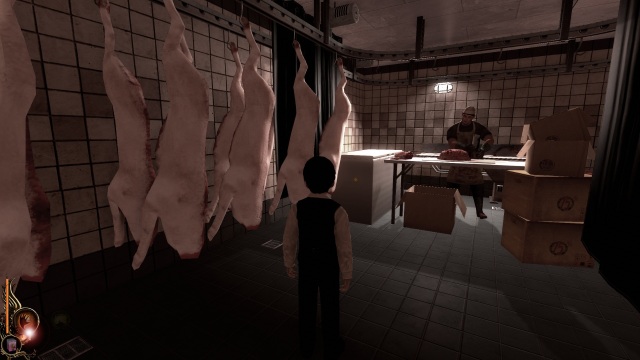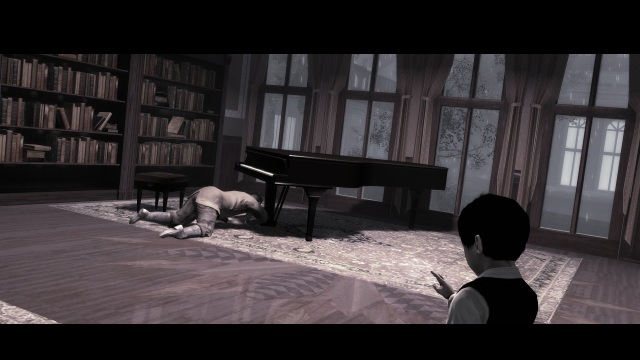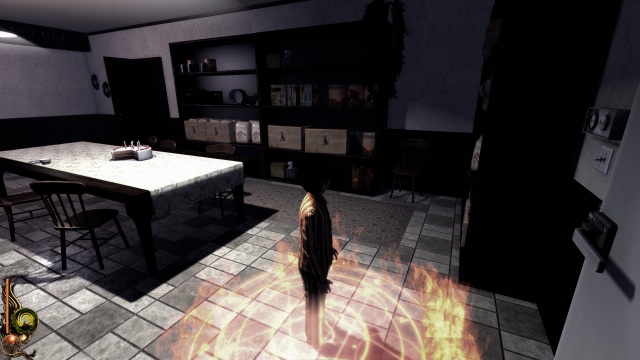Lucius Review
 Game: Lucius
Game: Lucius
Developer: Shiver Games
Publisher: Lace Mamba Global
Available on: Windows PC only
I’ve always considered myself a patient person. I install all of my games before I play them. I camp out for new consoles. I’ll wait in the bathroom line at Taco Bell. But Lucius has managed to teach me that even my patience has its limits. Clearly stated, Lucius is an exhausting experience, bordering on becoming work. Work where your metaphorical pay check is a series of gruesome murders, but work all the same. As with all things, though, the devil is in the details.
A rare entry into the horror genre, Lucius gives gamers control of the antagonist; not the antihero, but the antichrist. There is really no reason any psychologically sound being would root for Lucius on in his quest for souls, and that makes the game unique. June 6, 1966, a child is born to the wealthy inhabitants of the Dante manor. Now, some would argue that being born with a silver spoon in your mouth can put a lot of pressure on a child to become successful, I can only imagine how stressful it must also be to simultaneously be spawn to Satan himself.
That is precisely the case for young Damien…sorry, Lucius. After an “incident” wherein a maid is left to freeze to death in a walk-in cooler, Lucius is introduced to his demonic daddy who happens to come bearing gifts for the child’s 6th birthday. After receiving a flashlight and a notebook (oh, how diabolical!) from his old man, Lucius is sent on a quest to murder all the inhabitants of the manor, culminating in the slaughter of his biological father.

Gameplay boils down to what is essentially an adventure title, though one where you can control your character fully. The player must click the right tools at the right time in order to trigger the proper series of events. Along the way, Lucius must avoid being caught during pain in the ass stealth sections that are hardly worth noting because of how unbearable they can be at times. While the residents certainly can’t hear you (feel free to run all you want), they can somehow see you, regardless of eye line. And you’re supposed to be the one with supernormal abilities.
The game’s core concept of playing the bad guy remains engrossing for only so long, and soon the most novel quality of the game gives way to frustration; eternally damning frustration derived from a complete lack of direction on the part of the developer. Allow me to be direct in a way that Lucius never is: Games need direction. Gamers can only intuit so much.
You know that low frequency event where you’ll, on occasion, overlook something key? Maybe you spend way too long searching for something that should be obvious? Maybe you spend hours on a two minute task? The folks at Shiver have made a game out of it, opting to never give you an adequate amount of clues. At one point in the narrative, Lucius is tasked with killing the mansion’s butcher, Jed. After being introduced to his next victim, his journal — the game’s solitary means of guidance— reads “Jed is busy handling raw meat. Maybe I should mess with him a bit.”

And that’s it. That’s your clue. That’s your next step. After about an hour of searching around, clicking on clickable items (which is damn near everything in the expansive mansion), including Jed, I drag my mouse across a lighting fixture behind him. This lamp is really no different than any of the other lamps scattered around the mansion. In fact, the same room has multiple lamps that are identical to this one. How am I supposed to divine that I am supposed to sneak out of sight and, using telepathy, break the bulb.
A series of equally mundane and guideless tasks later, Jed is in two pieces. Worth it? I’m not sure.
The game isn’t long, in theory. Longevity boils down to whether or not you can solve the puzzles without too much trouble. I get the sense that the intended playtime of the game should be around 5 hours but if you, like me, get lost a lot, it could take you up to 10. If you use a guide, it could take you under one. If you rage quit, even less.
In terms of replay value, there is none. The game is linear both in the sense that you have to kill people in a specific order, but also in that there is really only one way to kill each of them. Assuming Lucius hasn’t used his Mind Erase ability (har har), all your replays will be virtually identical to your first play through.

The visuals leave much to be desired, while they’re not horrible, and I can respect how much effort it can take to render 3 dimensional objects for a small indie team, they’re certainly not up to today’s standards. Choppy animations and lower resolution textures barely surpass last-gen quality. Audio is suitably creepy and, to the game’s credit, the voice work is actually pretty decent. Character emotions are believable and personality is properly conveyed in all cases but the mute Lucius.
VERDICT: Lucius serves as a decent attempt in tribute to the original “The Omen,” but falls short in execution. Gameplay is oft frustrating and what is worthwhile about the game is lost in the negative, often leaving you wondering, “Couldn’t I be playing something else?” Sadly, this is one to avoid.






